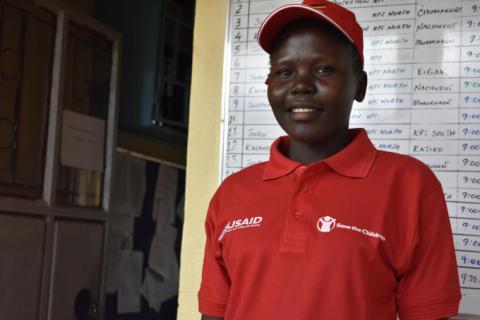Frontline Health Worker: Working to save lives amidst COVID-19 is a new normal
In the beginning it was very difficult. We don’t feel good about it but as being medical personnel, it has now become as our routine activities, our frontline health worker, Juan, 24, says.
COVID-19 is an issue that is very difficult to control by information and surveillance alone. People don’t see COVID-19 so they don’t believe it is there but malnutrition, pneumonia, diarrhea and malaria are tangible problems particularly among children under 5 in South Sudan.
The outbreak of COVID-19 in South Sudan has resulted into partial lockdowns that affected most humanitarian work of saving lives in the country. But for a Save the Children frontline health worker like Juan*, 24, it’s a new normal.
Juan, screens and treats at least more than 30 malnourished children and those with complicated illness in Kapoeta, Eastern Equatoria in a week. Juan and the team also provide follow up services, outpatient treatment feeding for children under five.
In Juan’s own words
“In the beginning it was very difficult. We don’t feel good about it but as being medical personnel, it has now become as our routine activities. Yes, there are other things that we cannot do, but there are preventive measures that can allow us to do it. Things like weighing the children, taking their height and then being not close to them, so these are the things that have really affected us and then the other thing is, by then we used to have them (children) weekly. Since the pandemic (COVID-19) came in, we don’t have them weekly. They now come twice a weekly to visit the OTP, then in TSAP, we normally have them once in a month which is really affecting us. I don’t feel well about it because it is affecting us. You find you may not be near to the beneficiaries, they come once a month whereby they will not be managed well at home.
Since we know the pandemic is worldwide, we need to accept. One of it is acceptancy, we need to aware the community, the beneficiaries about this pandemic. They have to know how this disease spread, how we prevent it. In this way we can cope mentally and physically. The second thing is doing awareness, give them awareness on this pandemic so that they can cope and also continue with the preventive measures. Things like putting on face mask, social distancing, frequent hand washing that would make us cope with this Corona Virus.
When this corona virus ends, I will be very happy because I will resume back my normal activities. I am expecting after this pandemic end, the donors should come up with a lot of activities because in this country there are a lot of problems especially children, they are Vulnerable. Most of them are malnourished, they are not protected.
COVID-19 is a new normal. I can’t stop working to save lives of children Juan. So, I expect health activities, activities should continue and I will be happy to work as this program continues especially Save the Children”
Program background
Poor infrastructure and on road insecurity are challenging in Kapoeta, Eastern Equatoria. Kapoeta is the biggest county in South Sudan so covering all areas was the biggest challenge. To address the gap, Save the Children with funding from USAID/OFDA deployed mobile team to reach hard to reach area to help the community access health and nutrition programs. In addition, lack of trained manpower was a big challenge in the operation site. To address the challenge, Save the Children invested on capacity building to train local staff and build the capacity of the local staff. In ICCM, Save the Children shifted task from Community Health Workers to Community Based Distributers by designing a program which can be adopted without compromising quality.
Written by: Tito Justin
 South Sudan
South Sudan 